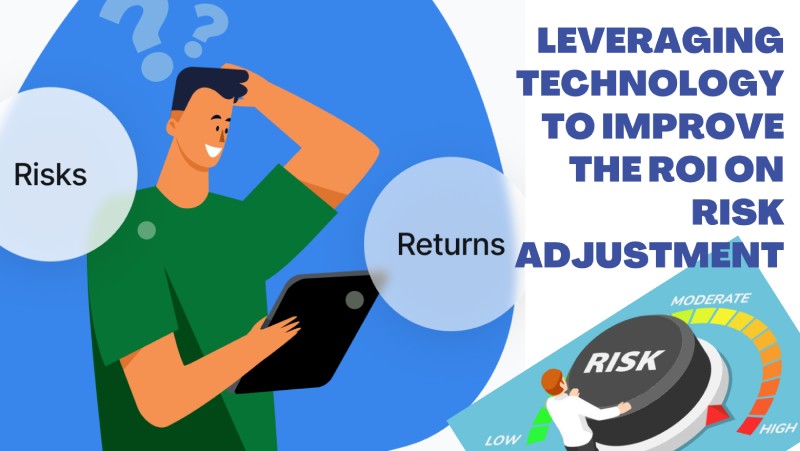
Risk adjustment plays a crucial role in the healthcare industry, helping to accurately assess and predict patient costs and outcomes. It involves the identification and adjustment of patient risk scores to account for variations in health status and ensure fair and equitable reimbursements to healthcare providers. While HCC coding risk adjustment has proven to be effective, it can be a complex and resource-intensive process. However, with the advancements in technology, healthcare organizations now have the opportunity to leverage innovative solutions to streamline and enhance risk adjustment, ultimately improving the return on investment (ROI).
In this blog post, we will explore how technology can be harnessed to optimize risk adjustment processes and deliver significant benefits to healthcare providers.
One of the key challenges in risk adjustment is the gathering, processing, and analysis of large volumes of data from various sources. Technology can streamline this process by automating data integration from electronic health records (EHRs), claims data, and other relevant sources. By leveraging advanced algorithms and machine learning, organizations can identify and extract pertinent information, eliminating the need for manual data abstraction and reducing errors. Automated data integration not only saves time and resources but also improves the accuracy and completeness of risk assessment.
Predictive analytics plays a crucial role in risk adjustment, enabling healthcare organizations to identify high-risk patients and proactively manage their care. By analyzing historical data and using advanced algorithms, predictive analytics models can identify patients who are more likely to develop chronic conditions or require costly interventions. These insights allow healthcare providers to intervene early, provide targeted interventions, and allocate resources effectively. Technology-driven predictive analytics can significantly enhance risk adjustment codes accuracy, leading to improved patient outcomes and cost savings.
Accurate and comprehensive clinical documentation is vital for risk adjustment. However, healthcare providers often face challenges in capturing and documenting patients’ clinical information correctly. Natural Language Processing (NLP) technologies can assist in automating clinical documentation by extracting relevant information from unstructured clinical notes, narratives, and other free-text sources. NLP algorithms can identify and capture diagnoses, procedures, medications, and other critical data points, improving the completeness and specificity of clinical documentation. This not only enhances the accuracy of risk adjustment but also helps providers capture appropriate reimbursement for the care they deliver.
Efficient communication and collaboration among different stakeholders, including coders, clinicians, and administrative staff, are essential for effective risk adjustment. Technology solutions such as secure messaging platforms, collaborative documentation tools, and integrated electronic platforms facilitate seamless communication and real-time information sharing. These tools help bridge the gap between various departments, enhance collaboration, and ensure that all relevant information is captured accurately. Streamlined communication not only improves the efficiency of risk adjustment processes but also minimizes errors and delays, resulting in better financial outcomes.
Technology can play a pivotal role in ongoing monitoring and auditing of risk adjustment processes. Automated tools can perform real-time audits, flagging potential coding or documentation errors and providing feedback for correction. By continuously monitoring risk adjustment activities, organizations can identify and address issues promptly, ensuring compliance with regulatory requirements and optimizing revenue capture. Automated auditing also minimizes the burden on human auditors and enables them to focus on higher-value tasks.
As risk adjustment becomes increasingly crucial in healthcare reimbursement, leveraging technology can significantly enhance the ROI on risk adjustment efforts. By adopting automation, predictive analytics, natural language processing, streamlined communication, and continuous monitoring, healthcare organizations can streamline workflows, improve accuracy, and ensure proper reimbursement for the care they provide.
Embracing technology-driven solutions not only drives financial benefits but also enables healthcare providers to deliver better patient outcomes. By leveraging technology to optimize risk adjustment processes, organizations can navigate the complexities of the healthcare landscape more effectively and secure a sustainable future.
In today’s competitive work environment, mentorship has become more than a professional courtesy—it’s a strategic… Read More
Choosing the right programming language is a foundational step in shaping a developer's career and… Read More
If you are involved in a life-changing accident, the days that follow can be filled… Read More
A strategic partnership between Adobe and LinkedIn aims to give creators better security for their… Read More
Sikar, Rajasthan | April 28, 2025 — After completing one successful year in the field… Read More
May is Small Business Month, a time to honor and recognize the achievements of the… Read More